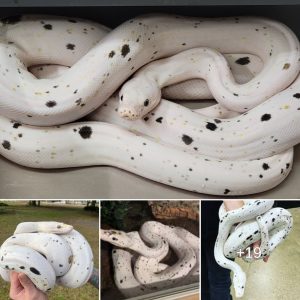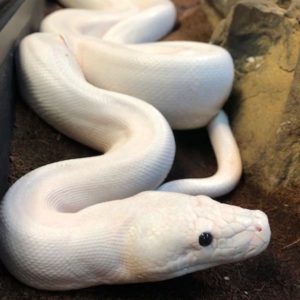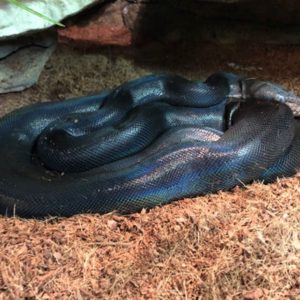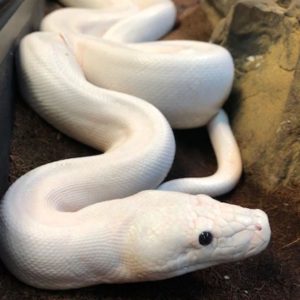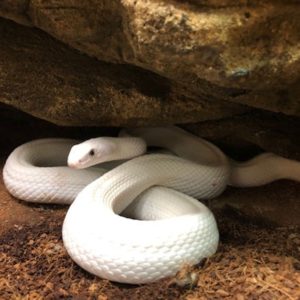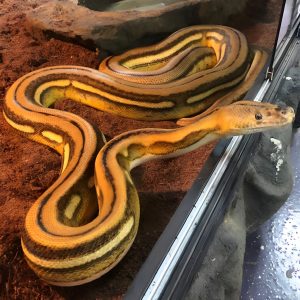Meet Crackle the Black-Headed Python!
What is a Black-Headed Python?
A member of the python family, Black-headed python (Aspidites melanocephalus) have a distinguishable look and appearance as they have a muscular and stocky looking body shape. The head and neck have a sharp, glossy jet-black color while the rest of the body usually appears in a dark brown or yellowish color tone. There are also a number of wavy bands or stripes from the neck to the tail that are darker than the rest of the snake.
Where do Black-Headed Pythons Live?
The Black-headed python is native to the Queensland, Australia area. They tend to inhabit woodland, rainforest and semiarid regions of the country and Northern territory regions of the continent. This type of python snake likes to burrow or bury in the ground, sometimes under leaves, brush and patches of grass. To protect itself from danger or predators, the black-headed python will take advantage of their shiny black coloring on top and only poke its head above ground, versus laying out in the sun for warmth. The head absorbs the heat, keeping the snake cool under the surface.
How Long do Black-Headed Pythons Live?
Black-headed pythons typically live up to 20-25 years. However, in captivity they can live as long as 30 years.
How Big do Black-Headed Pythons Get?
The average Black-headed Python will grow anywhere between 7 ft. to 9 ft. and will weigh up to about 35 lbs.
Are Black-Headed Pythons Rare?
No. Black-headed pythons are fairly common in the Northern areas of Austrailia and Queensland. They have also recently become a popular snake breed to own as a pet. Because of their more docile nature, they are easier to handle and have a better tolerance for human contact.
Did You Know? One well known nickname for the Black Headed Python is a “tarpot” because the black on their head and neck makes them appear as if they have been dipped in tar.
What do Black-Headed Pythons Eat?
Black-headed pythons are carnivores meaning they are mostly meat-eating creatures. They tend to feed on small rodents, lizards and frogs. However, since the Black-headed python is impervious to venom, they are able to eat other venomous snakes, which they are known to do in the wild.
Are Black-Headed Pythons Dangerous?
Black Headed Pythons are nonvenmous are not dangerous to people. Because of their muscular build, they are known to do a head butt style bite, lunging forward quickly with their mouth closed. This manuever can pack a punch and be painful, which can cause some minor harm if the snake is large enough. Overall, the Black-headed python is very mild mannered and calm. These snakes are not naturally aggressive, but they do appreciate a solitary lifestyle and don’t like being around other snakes.
Are Black-Headed Pythons Endangered?
The Black-headed python is classified as Least Concern on the IUCN Red List. As mentioned above, Black-headed pythons have become a popular snake to breed and sell in the pet trade. Does this make a black-headed python a good pet? This depends. You’ll want to take the time to do your research on how to care and handle this reptile.
When they are young, the Black-head python can be a skittish snake. So it’s recommended to keep handling to a minimum until they are established feeders. Juveniles can be quite nervous and will have a tendency to bite if you handle them too much, this is their way of self-defense of an assumed threat. However, once out of the cage they often become more relaxed. After a period of time as it’s adapted to the surroundings, you can start handling it every other day. Frequent handling will allow the snake to become accustomed to you and they will know you are not a threat.
Check Out the YouTube Video on the Black-Headed Python!

